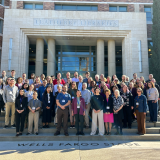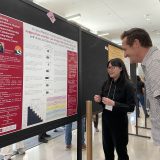
Exploring the Intersection of Faith and Environmental Advocacy Alumni Spotlight: Tami Chipeco '18
January 4, 2021
 Tami Chipeco ‘18 studied Environmental Science and Policy as an undergraduate. Following graduation, she took the opportunity to explore the intersection of her faith and environmental advocacy as the Ecological Discipleship Coordinator for InterVarsity Christian Fellowship. This national Christian non-profit organization connects students on college campuses to empower and equip them to lead Bible studies, develop their leadership skills, and deepen their spirituality.
Tami Chipeco ‘18 studied Environmental Science and Policy as an undergraduate. Following graduation, she took the opportunity to explore the intersection of her faith and environmental advocacy as the Ecological Discipleship Coordinator for InterVarsity Christian Fellowship. This national Christian non-profit organization connects students on college campuses to empower and equip them to lead Bible studies, develop their leadership skills, and deepen their spirituality.
As the first Ecological Discipleship Coordinator, Chipeco educates students on climate science and policies, environmental and racial justice, decolonizing/indigenizing Bible readings, and reconnecting with nature. Much of her work takes place in discussion-based forums, ranging from small groups to national justice programs. They have hosted webinars, created audio prayer guides, and written Bible study curriculum as a result of these collaborations. She says, “day-to-day, I think about relationships and partnerships a lot. I connect with other InterVarsity staff who have their own interests and involvement in theology of the land or environmental causes. We discuss the current needs of students and how Ecological Discipleship can minister to those needs. In order to connect students to important theologians, ecologists, speakers, farmers, content creators, etc., I put my networking skills to work to foster relationships with these people.”
While at Chapman, Chipeco explored both science and rhetoric classes, which inform her work today. She says, “The interdisciplinary nature of a school like Chapman prepared me to consider the importance of holding complexity when dealing with real life and real people. I majored in environmental science and policy with a policy emphasis, and I minored in rhetoric and writing studies. I learned so much about the science that informs political decision-making on the local and global scale, but also about the power, privilege, and identity that inform language and how we can effectively communicate climate issues. I was fortunate to have coincidental learning experiences in STEM and language. [At Chapman] I was taking data on intertidal limpets in Dr. Wright’s marine biology class and computing theoretical atmospheric chemistry into real “ball-park” answers in Dr. Keller’s “Environmental Problem Solving”, while at the same time, exploring pedagogy and epistemology in Dr. Osborne’s “Foundations of Rhetorical Studies” and digging into the colonial influences of the US empire on my own intersectional ethnic identity in Dr. Barnard’s “Language and Ideology”. We cannot escape complexity, even when many influences in our world try to flatten our experiences, theology, and even data into reductive, over-simplified sound bytes that misrepresent the truth. My time at Chapman has helped me embrace and honor complexity in ways that make me a more effective, justice-oriented, and honest spiritual leader.”
Climate and environmental science have long appeared to operate in a realm separate from religion. As a student with a strong understanding of environmental science, Chipeco found this frustrating. “In general, the American Christan Church has been too silent for too long about the urgent realities of climate change and environmental injustice. I had felt so much tension since I was in high school waiting for someone from my religious community to say anything about these issues, and once I became more socially and politically aware, my dissatisfaction with Christian inaction only got worse.” When an opportunity presented itself for Chipeco to address this gap, she jumped at the chance. She says that she wanted to be the voice to “tell young Christians that they’re not crazy or unfaithful for believing science… and that there is a way forward in which young people who are clinging to the hope they found in Christian spirituality can change the environmental, political, and religious landscape before this planet is uninhabitable.”

